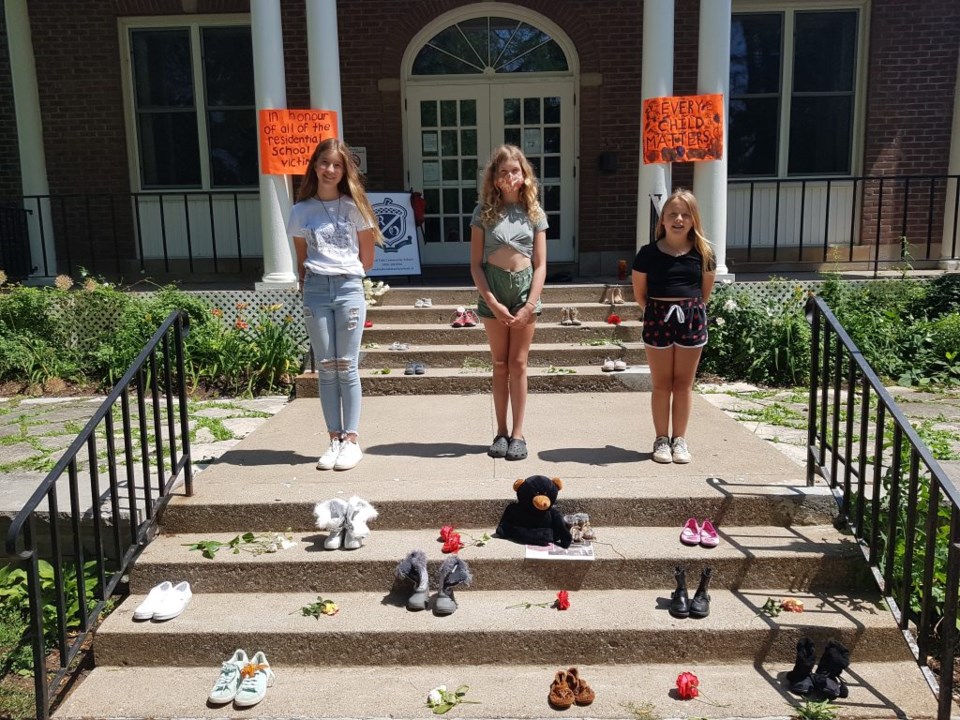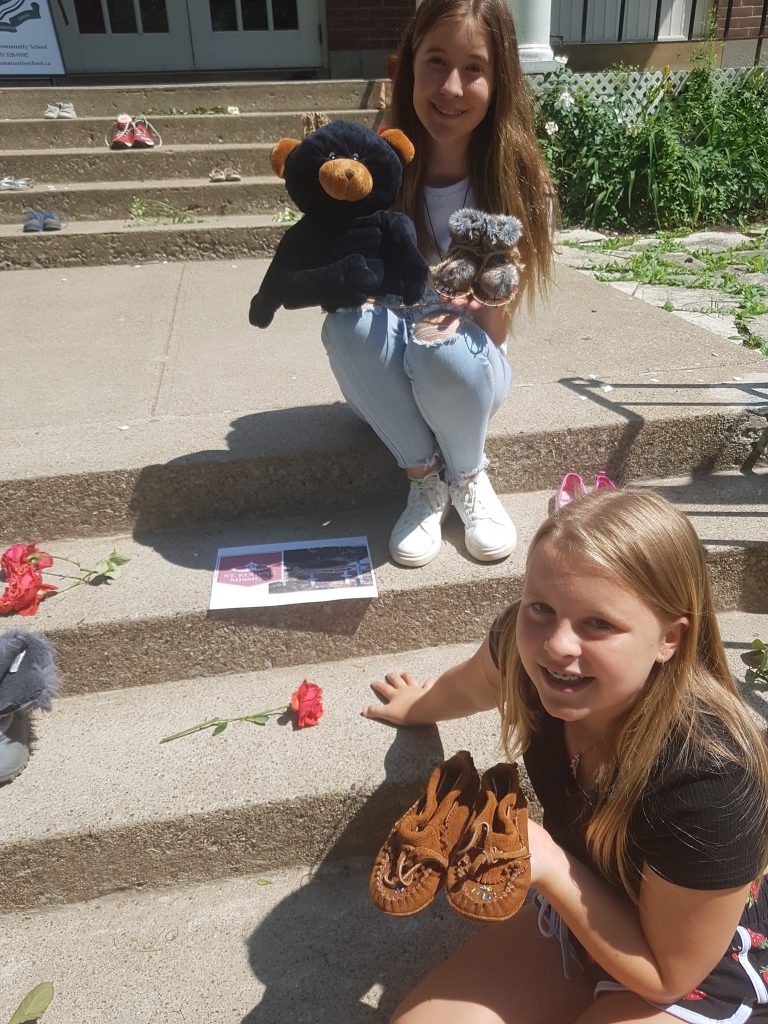
For students of Royal Oak Community School, learning about Indigenous people, including residential schools, is about much more than Orange Shirt Day.
With mixed reactions and emotions leading up to Canada Day, and discussions of cancelling or altering celebrations after discoveries of unmarked graves at residential schools, two Royal Oak students decided they wanted to do something to honour and acknowledge the children who died while at those schools.
Leila Ridesic and Ruby Elltoft, both going into Grade 7 in September, chose Canada Day to set up a memorial on the steps of the former Wellington Street hospital, the current site of their school, with a collection of shoes, which have become a symbol of mourning and recognition.
Their school recognizes Sept. 30 as a day set aside to wear orange shirts to honour Indigenous children, they say, and the day is also used as a learning tool to teach students, but at Royal Oak, Indigenous education has been an important part of its curriculum for many years.
The girls mention both head of school Julia Murray and teacher Kristen Koyle have backgrounds in Indigenous education, and students are taught regularly their history and culture.
“They are qualified to teach these subjects,
They even have a small, special library dedicated to books about Indigenous people, and are encouraged to read them, the girls explain.

Both mention a book called Fatty Legs, a true story about an Indigenous girl who faced bullying and cruelty at a residential school, that helped them understand what the schools were like, and how Indigenous children were treated.
The main character in the book had actually wanted to go away to school, knowing it was a five-day journey from her home, but anxious to learn. She soon learned it was not what she expected.
The title of the book, explains Ruby, refers to the beautiful red stockings the girl’s mother had made for her, but which she was not allowed to wear.
Leila remembers reading the book as well, and realizing how really awful it was for the children who attended residential schools.
Eliana McManus, a Crossroads Public School student who has been friends with Leila and Ruby since their days at Parliament Oak, before the Old Town school closed, stopped by on her bike to attend the memorial and visit with her friends.
Although her school recognizes Orange Shirt Day, she says, there have been no lessons about residential schools.
“I learned about them from my mom,” she says. “It has never been brought up at school. But I knew about the residential schools. I knew they were never good.”
The girls also mention Anne with an E, a CBC TV spin-off from the Anne of Green Gables tales. In its third season, Anne becomes friends with a young First Nations girl, and the show becomes an opportunity to teach kids about Indigenous issues, and the dark side of Canadian history.
Eliana’s father, actor Patrick McManus, plays a priest in the series. The girls talk about the irony of a “really nice man” playing a part of someone who is not so nice, but they also found it an eye-opener regarding Canadian history, and an opportunity to discuss it with their parents.
“It’s important to know what is going on,” says Ruby.
“It wan’t that long ago that this happened,” adds Leila, referring to residential schools, “and a lot of people didn’t know about them. Residential schools were around for a long time, and people didn’t see that they weren’t okay, that what was happening there wasn’t right. It’s very important that we know that now, and that people who don’t know can ask questions,” she says, explaining why they decided to have their memorial on Canada Day.
Throughout the day they had some students drop off shoes, and some passers-by ask them what they were doing, Leila said. “I’m very glad about that. It feels good that at least some people stopped to look at what we’re doing, and to be able to do something for the community.”
Leila was also glad to see a number of orange shirts on people who were walking their dogs or cycling by, she said.
Ruby’s mom, Kim Elltoft, with the girls on the steps of Parliament Oak, says she’s grateful for the school’s instruction in Indigenous education, which tailors what it teaches to the appropriate age level of the students.
Parents are informed of lessons weekly, and that gives them an opportunity to know what their kids are learning, and continue discussions with them, she explained.
Hopefully, recent news and an increased awareness of residential schools may encourage the public school board to change their policies on Canadian history and include more Indigenous education in their curriculum, Elltoft added.
As a member of the Landscape of Nations 360 Roundtable, ROCS head of school Julia Murray has helped create curriculum and professional development experiences in Indigenous history for the District School Board of Niagara and independent school teachers across Niagara.
ROCS teacher Kristen Koyle has a masters in education, with a specialty in Indigenous education, and completed a year-long Landscape of Nations educator’s course.
Tim Johnson heads the Landscape of Nations 360° Indigenous Education Initiative alongside Michele-Elise Burnett, who works as associate director for the initiative, as well as a team of Indigenous advisors and cultural resource specialists.
The Landscape of Nations 360° Indigenous Education Initiative is a not-for-profit organization that creates, designs and implements programs to teach Niagara students from Kindergarten to Grade 12 about Indigenous people, their culture and their contribution to Canadian history and society.
Murray, a lead educator in that initiative, has ensured Indigenous history, perspectives and truth are a priority in the school’s curriculum.
“For too long, children have learned only a partial history, and the experience of Indigenous people in Canada has been purposely excluded from this narrative,” she says in a note to parents leading up to Canada Day.
Royal Oak, she says, includes teaching the truths of Canada’s policies regarding residential schools and Indigenous policies, including current living conditions in many First Nations communities.
The Grade 6/7/8 class delved into the Truth and Reconciliation report, studied water quality and access in First Nations communities, and as far back as September, she says, included Indigenous experts in their study of the constellations and astronomy.
Younger students learned about the Haudenosaunee and Anishinaabe people, and ways of living in the region, historically and to the present day. Junior grades were active participants in learning about Autumn Peltier, a Canadian water activist advocating for clean drinking in First Nations.
Murray also shared a book list and other resources for parents and students, at https://www.cbc.ca/books/
20-canadian-books-for-kids-and-teens-to-read-for
-national-indigenous-
history-month-1.5597339.